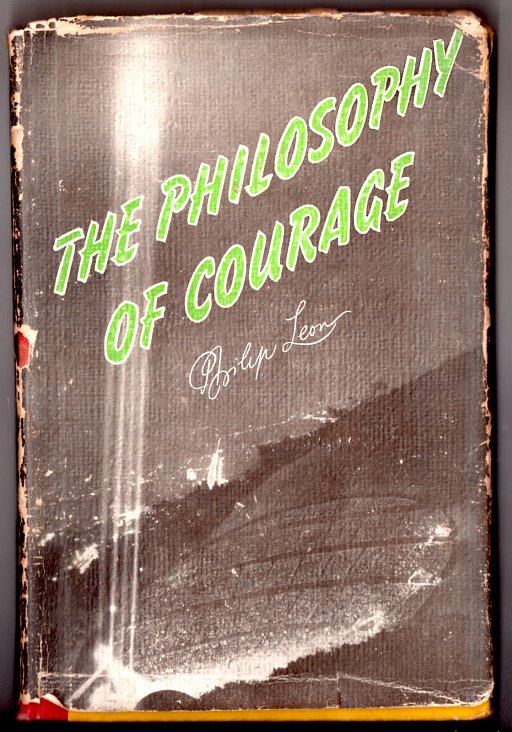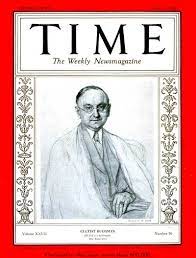Selected Reviews by Subject:- Film, TV, DVDs, CDs, media critics | Health, Medical | Jews (Frauds, Freemasons, Religions, Rules, Wars) | Race | Revisionism | Women | Bertrand Russell | Richard Dawkins | Martin Gardner | H G Wells
 Review of The Philosophy of Courage Philip Leon
Review of The Philosophy of Courage Philip Leon Jew propaganda straddling WW2. Dip into Jews in USA, UK, and South Africa. Supporting the 'Oxford Movement' and 'Moral Rearmament' as anti-Nazi controlled opposition. Extraordinary number of printings and recommendations. Philip Leon was in University College, Leicester.
Jew propaganda straddling WW2. Dip into Jews in USA, UK, and South Africa. Supporting the 'Oxford Movement' and 'Moral Rearmament' as anti-Nazi controlled opposition. Extraordinary number of printings and recommendations. Philip Leon was in University College, Leicester.
I have an old, tattered copy of this octavo (small, paperback size) hardback, complete with its advert-filled dustjacket. The cover I think must have been a Nuremberg Rally, symbolically after defeat. I had connections with Leicester University—see my review of David Attenborough—and descendants of Leon in Cape Town, South Africa. His family was Jewish, from Rumania, as far as I know.
My unimpressive copy proved to have unexpected tentacles around the world. First, the book seems to have been distributed by several publishers, perhaps all using the same printer. My copy was printed by Blandford Press Ltd, London, WC2. But I found George Allen & Unwin published the book at about the same time, under the title The Philosophy of Courage -or- The Oxford Group Way.
To my amazement, I found Blandford Press still exists, as an 'active company' at Carmelite House, 50 Victoria Embankment, London EC4Y 0DZ. It shares the address with other publishers, mostly as 'Private Limited Companies' with Total Assets of zero, Total Liabilities of zero, and therefore net assets of zero. I'm guessing these are holding companies or publishers' rights companies or something; their foundation dates being all post-1945, perhaps on the deaths of publisher or their more lucrative authors. I can't resist listing some: Littlehampton Book Services Limited, Cassell Educational Limited, Ward Lock Publishing Limited, George Weidenfeld Holdings Limited, J.M.Dent & Sons Limited, Quercus Publishing Limited, Orion Books Limited, Victor Gollancz Limited.
Philip Leon spent time at the then-College in Leicester. He doesn't seem to have been regarded as a great asset; my copy of Who's Who of 1948 doesn't list him at all. No doubt he carried out one of his duties—to keep out a talented Brit competitor. His other books include Plato '17 editions published between 1932 and 1980 in English...', The ethics of power; or, The problem of evil '12 editions published between 1935 and 2018 in English', The professors, an inaugural lecture delivered at University College Leicester, in 1955, presumably when he was made a Professor. And a couple of others.
It's interesting to see Plato in his writings. Many church philosophers, had they had extreme longevities, would have been irritated to see that. But of course Crossman, Popper and other Jews no doubt felt dislike for them. Plato was published in the 'Discussion Books' series, an inferior 'Home University Library'. See e.g. East, The Geography Behind History.
The dust jacket's inside flap of ... Courage says: The philosopher turned king ... was Plato's only hope of a better world in the 4th century B.C., for he despaired of the anarchic democracy which had lost for his native city her Great War ...
The World War which had recently ended has been won by democracy for democracy, and the hope of a better world must lie for us in such a responsible and efficient system... (No silly stuff on Stalin not being democratic!)
The Problem of Evil may have been more popular than I'd imagined. A writer in the Jewish-funded Manchester Guardian 'newspaper' blurbed it, as did Reinhold Niebuhr, and Benedetto Croce. I'd though the title was C S Lewis's, but he seems to have written on the problem of pain. Russell's History of Western Philosophy comments dismissively.
Only on the back of the dust-jacket—helpfully disposable—is Frank Buchman, 'the man of the age', mentioned, a biography by Peter Howard. We also have The Bomb that Fell on America by Hermann Hagerdorn, a 'poet-prophet [who] found words to shake us to a new realization of the meaning of an event too vast to be put into prose...' The subject was Hiroshima; after a hiatus, this had been shaped into another Jewish fraud. Hagedorn contributes another poem, Combat at Midnight, 'an individual expression of a universal truth'—post-war Jews like that sort of thing. There's as yet nothing on the 'Holocaust'.
And the inside back flap has 'some opinions' on The Philosophy of Courage by Ernest Raymond, the Jewish New Statesman, and Time and Tide which has worn less well.
The content of this book is at a considerable angle from the promises I presume advertised it. One of the blurbs says: ‘If you do not want to be singed by the flames of Absolute Purity and Love, leave this book in the bookshops. If ... you have the hardihood to come close to the Presence, and stare into the awful implications of Deity and its service, get it and read it. ...’
Obviously, Leon never came close to needing any courage to collect his Jew-oriented pay. But for vast numbers of servicemen (about 400,000 deaths of Americans, I think) and even vaster numbers of bombed and burned and starved civilians, something more might have been needed. Books of this sort must have been aimed for survivors and supervisors and administrators and carriers-out of simple tasks. I'm reminded of C. S. Lewis, telling the softer types of war-tasked people to believe in prayer. I'm reminded of Kevin MacDonald, faced with the agony of getting nasty emails on entering California Long Beach University. I'm reminded of the Very Rev Hewlett Johnson on Soviet Success and other such works. I'm reminded of Norman Bentwich, a Jew educated in England but with Talmudic mentality. There's material on Bentwich in this booklet on Jews after the second world war was thought to be over.

Well, perhaps. Buchman came from a Lutheran mother; this of course may be a codeword for Jewish. He went around the USA, UK, and South Africa, and even to Germany, where he attended a Nuremburg rally. I hope some at least of my readers will wonder whether Buchman was a crypto-Jew aiming to ensure Christians would oppose Germany.
He's quoted [not checked by me] as thanking God for Hitler's opposition to 'Communism'—not, of course, Jews. The group was later renamed ‘Moral Rearmament’ and must have been met with cynicism. But since the critics were not Jew-aware, they were fairly harmless to Jewish interests, and lacked any bite in their commentaries. This was true for the whole period from 1913. It's not surprising that Jews, following their scripts and playbooks, and controlling the media, brushed off their enfeebled criticisms.
Topics include Prayer, The Quiet Time, Sex and those who hold the rationalistic or Pharisaic attitude. In other words, Jewish stuff where it resembles Christianity.
The preface to the third edition struck me as incredibly repellent: in effect, he thanks God for his personal survival of the Second World War. The 'war has passed over us like a deluge. Turning round the famous saying attributed to Louis XV, each miraculously surviving individual must say, 'Après le déluge, moi.' Miraculous? We of the revisionist school know better.
Rae West 9 June 2021
© HTML, research, scanning etc all by Rae West. First upload 9th June 2021.